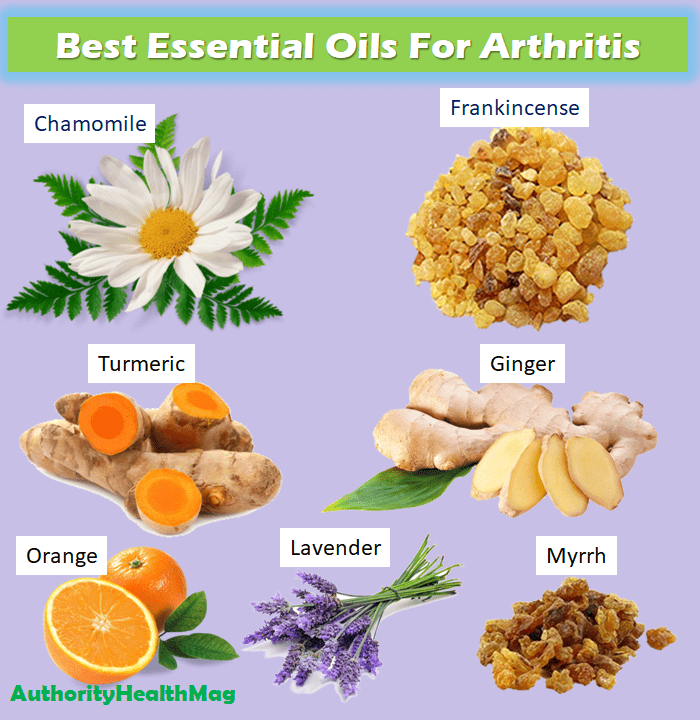The inflammation caused by rheumatoid arthritis and osteoarthritis can be painful and decrease the range of motion. It can make your life difficult by causing painful swelling and stiffness in the knees, hands, fingers, wrists, ankles, shoulders, and elbows.
Using essential oils for arthritis can soothe pain and stiffness arising from this disease.
The winter and rainy seasons are the most challenging times for arthritis patients. According to a Mayo Clinic report, the risk of joint inflammation is high among older adults.
According to one estimate released by the Centers for Disease Control and Prevention (CDC), over 52.5 million adults in the U.S. alone suffer from this inflammatory condition.
Rheumatoid Arthritis: An Overview
Arthropathy is an inflammatory disease that affects the joints. Arthritis has two types: osteoarthritis and rheumatoid arthritis.
Osteoarthritis is caused by the wearing down of the cartilage between joints due to overexertion of the legs, hands, or spine. It mostly occurs in the knees, hands, fingers, spine, and hips.
Rheumatoid is caused by autoimmune dysfunction involving cartilage destruction by white blood cells.
Food allergies, excess acid in the body, stress, or bacterial infection can cause it.
Proven scientific explanations still need to be provided for autoimmune dysfunction.
Symptoms
Depending on the type of arthritis you have, the signs and symptoms may include the following:
- Pain
- Stiffness
- Swelling
- Redness
- Decreased range of motion
Treatment options for arthritis
Rheumatism has various treatments depending on the type and severity of the disease. Here are a few commonly used treatment options:
- Nonsteroidal anti-inflammatory drugs (NSAIDs) like ibuprofen and naproxen sodium
- Analgesic medicines like acetaminophen, tramadol, and narcotics containing oxycodone
- Counterirritants: creams and ointments containing capsaicin or menthol
- Disease-modifying antirheumatic drugs (DMARDs) such as methotrexate and hydroxychloroquine
- Biologic response modifiers: tablets like etanercept and infliximab
- Corticosteroids: drugs such as prednisone and cortisone
- Physiotherapy
- Surgery
- Joint repair with procedures like arthroscopy
- Joint replacement
- Joint fusion
Natural Remedies for Arthritis Pain
Several natural remedies work well for alleviating the symptoms of arthritis. Here are some of the most effective home remedies you can use for knee pain and arthropathy:
- Essential oils
- Herbal creams
- Oil blends with herbal extracts (Ayurveda).
- Maintaining a healthy body weight
- A healthy diet with nutrients for joint health
- Regular exercise
- Yoga exercise
- Massage with herbal oils and warm compresses
Do Essential Oils for Arthritis Help?
You may have already tried and tested a couple of over-the-counter (OTC) medications to manage the symptoms. Just forget about that OTC stuff, as there are better natural remedies to look for. There are a few essential oils that help relieve joint inflammation.
For hundreds of years, essential oils have been used to treat various common infections and inflammatory issues.
Aromatherapy with EOs has powerful effects on improving physical, emotional, and spiritual well-being. Aromatherapy can relieve the pain and stress caused by diseases. It relaxes and comforts both the body and the mind.
Using essential oils in conjunction with other alternative treatments like massage, acupuncture, Ayurveda, or homeopathy is possible.
Many patients prefer to employ essential oils simultaneously with prescription medicines.
According to a study published in the Journal of Lipid Research, many essential oils contain anti-inflammatory properties. Antioxidants in EOs can reduce the harmful effects of inflammation on the body. So, using some of these plant oils can quickly lessen the symptoms of arthritis.
Sufficient scientific evidence is needed to support the effectiveness of these oils in dealing with joint inflammation. However, traditional natural remedies across the globe vouch for the efficacy of EOs in managing the symptoms of degenerative disease.
How Do Essential Oils Work?
Essential oils are extracted from various plant sources. Most of these oils contain one or more therapeutic elements, such as anti-inflammatory, antioxidant, antimicrobial, or analgesic properties.
Research literature shows that oils from ginger, orange, black cumin, and frankincense have a promising effect in dealing with joint inflammation from gout.
An essential oil massage on the affected area allows the therapeutic elements in the oil to penetrate through the skin and reach the plasma. Therefore, topical dermal delivery of EOs gives the infected region the anti-inflammatory agents and antioxidants necessary for calming down rheumatism.
A report published by the U.S. National Library of Medicine informs that the topical application of an ointment containing essential oils may reduce the severity of arthritis. The suppression of joint problems may even change the disease’s relationship to immunological and biochemical mediators of inflammation.
8 Best Essential Oils for Arthritis
Applying essential oils for relieving the symptoms of arthritis is more effective than using prescription medicines. These oils reduce pain and stiffness and relax the body and mind. Most importantly, unlike conventional medicines, they do not have any side effects.
As proved by anecdotal evidence from research, topical application or aromatherapy with essential oils helps to reduce joint inflammation caused by osteoarthritis or rheumatoid arthritis.
Anti-inflammatory essential oil treatment for urarthritis should be done daily and regularly to achieve the desired result.
Here are the best essential oils for chronic pain from arthritis:
1. Eucalyptus essential oil
Eucalyptus oil is well known for its powerful analgesic and anti-inflammatory properties. It helps improve circulation.
According to a study, inhaling eucalyptus oil significantly reduces pain and inflammation. The knee replacement patient got pain relief from eucalyptus aromatherapy for arthritis.
Patients with rheumatoid arthritis can topically apply diluted oil or gel to the affected area. It begins to reduce rheumatoid inflammation like a prescription medicine.
Note that the results of natural remedies will vary from person to person.
2. Frankincense essential oil
Frankincense oil can inhibit the production of certain inflammatory molecules that cause this joint disease. This oil helps prevent the breakdown of cartilage tissue. It has high potential anti-inflammatory properties.
Frankincense oil is a proven remedy for treating painful conditions that affect tendons, joints, and muscles.
According to a Phytotherapy Research report, B. frereana (frankincense) prevents collagen degradation and inhibits the production of pro-inflammatory mediators and MMPs.
3. Ginger essential oil
Ginger oil contains medicinal properties that produce anti-inflammatory and analgesic effects. It acts directly on vanilloid receptors in the sensory nerves and relieves pain.
A group of researchers at the University of California, Los Angeles, discovered that ginger affects certain inflammatory processes at a cellular level.
Another study at the University of Miami found that ginger extract can produce the same effect as nonsteroidal anti-inflammatory drugs (NSAIDs). This study showed that ginger extract helped reduce stiffness and pain in knee joints by 40 percent over the placebo.
4. Turmeric essential oil
Turmeric oil contains curcumin, an effective anti-inflammatory agent. Many of the popular natural remedies for arthritis have turmeric as a chief ingredient.
One of the recent studies from Japan discovered that curcumin has a close relationship with interleukin (IL)-6, the inflammatory cytokine known to be involved in the RA process. Thus, curcumin has the potential to reduce joint swelling and pain.
5. Myrrh essential oil
Myrrh is another useful essential oil that works well for managing arthritis, pain, and swelling.
A study published in Neuroplasticity vouches for the usefulness of myrrh and frankincense for treating inflammatory diseases like arthritis.
Using myrrh and frankincense extracts or oils in combination reduces the intensity of joint swelling and pain.
6. Orange essential oil
Orange oil is rich in anti-inflammatory properties. They help to fight pain, stiffness, and swelling caused by arthritis.
A 2009 study that appeared in the European Journal of Medical Research projects orange oil as one of the essential oils that are highly useful for combating the symptoms of arthritis.
Massaging the inflamed area with a few drops of orange oil diluted with a spoon of avocado oil gives quick relief from pain and stiffness.
7. Lavender essential oil
Lavender oil is well known for the medicinal properties it contains. This oil’s anti-inflammatory and analgesic properties are particularly beneficial for treating degenerative joint disease.
According to a medical review published by the Natural Medicine Journal, lavender oil relieves your body and mind of the stress, anxiety, and depression caused by the pain of inflammatory diseases.
8. Chamomile essential oil
In a study published by Molecular Medicine Reports (MMR), chamazulene and other flavonoids in chamomile oil were found to have anti-inflammatory and anti-phlogistic properties.
Roman chamomile essential oil has potent anti-inflammatory properties that help to soothe and calm down pain and swelling. Besides the oil, other herbal extracts of chamomile are also widely used in natural remedies for their soothing and anti-inflammatory effects.
Massaging gout-affected joints with chamomile oil reduces pain and stiffness.

How to Use Essential Oils for Arthritis
Symptoms of rheumatoid arthritis and osteoarthritis can be alleviated with an essential oil treatment. There are many effective ways to use these oils for arthritis treatment.
Diffuser
Diffusing EOs in your living room and bedroom can produce a physically and mentally relaxing and calming effect.
Topical application
Massage the affected area with the essential oil blends. This allows the analgesic and anti-inflammatory properties to penetrate the plasma and reduce inflammation.
Ingesting
It is possible to ingest some EOs. You can safely consume a few drops of ginger, turmeric, or orange oil, either diluted in water or mixed into food.
Aromatherapy
A few essential oils like lavender, chamomile, or frankincense work well for relieving pain when used in aromatherapy.
Possible Side Effects Of Essential Oils
Essential oils contain high-potency chemical concentrates from plant sources. Using them in undiluted form may cause skin irritation and allergic reactions.
Your body may become oversensitive to some of these oils. Do a patch test on your skin before using the oil for the first time.
Patients with serious heart conditions should use oils cautiously after consulting their doctor.
Always purchase essential oils from reputed brands that provide 100 percent purity.
Pregnant or breastfeeding women should not utilize essential oils without their doctor’s approval.
Most oils are safe for children when used in low doses and diluted with carrier oils.
Patients with serious health conditions on regular medication should exercise caution when utilizing essential oils to treat arthritis.
The Final Thought
Osteoarthritis and rheumatoid arthritis have become major health issues that affect millions of elderly adults across the globe.
There are several ways to get relief from degenerative joint disease. However, most of the treatments for rheumatism are just about reducing the symptoms of joint inflammation temporarily.
Instead of availing of expensive treatments for rheumatism, you can always use natural remedies like essential oils for managing joint pain.
The best essential oils for arthritis are ginger, turmeric, frankincense, chamomile, lavender, myrrh, and orange.
Recommended reading list:
